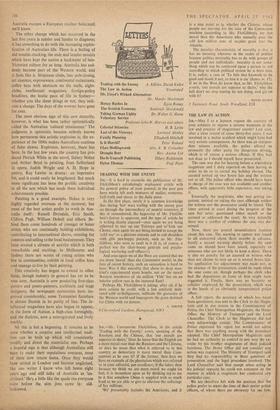Sot,—Mr. Constantine FitzGibbon, in his article 'Trading with the Enemy,'
avers, speaking of the Russians, and the Chinese, that 'our morals are superior to theirs.' Does he mean that the English are a more moral race than the Russians and the Chinese, or does he mean that what is referred to in this country as democracy is more moral than Com- munism as he sees it? If the former, then here we have an example of the pharisaism which was referred to in your editorial, par excellence; if the latter, then because we think we are more moral we ought (in fact, it is incumbent upon us by thinking so) to see to it that somehow China is supplied with as much food as we are able to give to alleviate the sufferings of her millions.
'We' presumably includes the Americans, and it is a nice point as to whether the Chinese, whose people are starving for the sake of the Communist machine (according to Mr. FitzGibbon), are less moral than the Americans who annually pour the odd few million tons of surplus grain into the Atlantic.
The peculiar characteristic of morality is that it has no meaning whatever in the realm of politics because politics inevitably has to do with groups of people and not individuals : morality is not some- thing which can be conferred upon a person or not according to which political system he is born into. It is, rather, a case of 'To him that knoweth to do good and doeth it not, to him it is sin' (James iv, 17). If we in the West do know that, as Mr. FitzGibbon asserts, 'our morals are superior to theirs,' why the hell don't we stop sinning by not doing, and get on with it?
DAVID














































 Previous page
Previous page